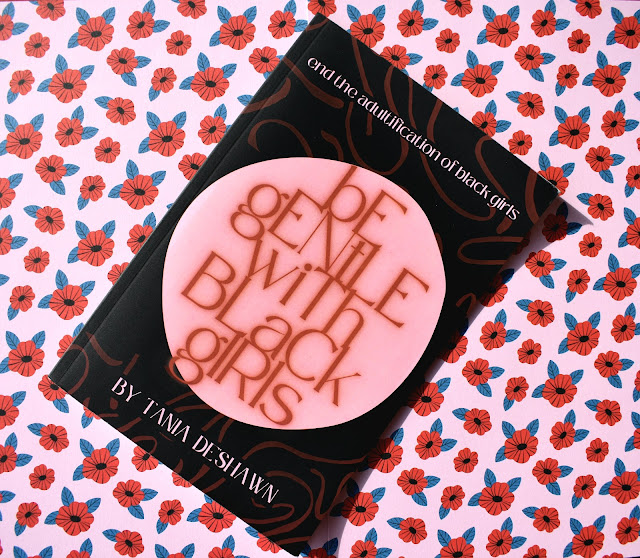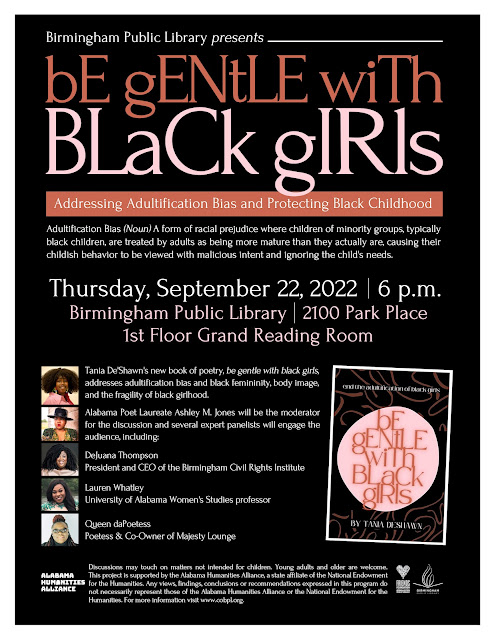Book Review: "be gentle with black girls" By Tania De'Shawn
While some may detract that we should be gentle with all children, the study Girlhood Interrupted found that adults view black girls as being less innocent and needing less protection than their white peers. This is known as adultification bias.
And this is the lens that Tania De'Shawn uses in be gentle with black girls to tell the story of a young black girl named Deja from girlhood to adulthood.
Told in poems, we follow our protagonist as her childhood is chipped away at by the biases of other people but later evolves into a cosmic sense of self-love.
As the story progresses, select poems introduce the reader to pivotal key words, servings as definitions in creative prose. De'Shawn uses common AAVE words, like "be," "fast," and "pocketbook," and highlights them throughout her poetry to show how they shape Deja's story.
"Be" empowers and manifests the purpose of this book—that black girlhood is sacred and valued in this space and continues to be. However, we see that "Fast" and "Pocketbook" have a different effect on Deja.
The duality of the language organically tells the story and adds a complexity that Deja has to balance as older community members use words that others used to describe them in their childhood to define Deja's young body in the vocabulary of a grown up.
It's easy to be enraged when the adults around Deja fail her, but be gentle with black girls demands more than raw anger. There is a safe space in these pages that asks the reader to be vulnerable, to hurt, to mourn, to heal, and to be gentle with yourself and those around you.
Sentimentality, one of my favorite poems in the book is "Fannie Pearl."
While the eponymous character is stoic like a granny sentinel, the descriptions of a Sunday supper with turnip greens and tomato slices, the home-grown garden, and the quiet reservation that Fannie Pearl carries herself with as she cooks and feeds the men in her family reminds me of my own grandmother's kitchen, too.
"Fannie Pearl" tugs on the heartstrings of familiarity while also reevaluating "what makes her silent." This poem pulls back the nostalgia of those precious memories in a bittersweet way to consider what we internalize in those early childhood memories and what life experiences formed Fanny Pearl into the adult that she is.
Ending at 35 pages, be gentle with black girls closes out the "Acknowledgments" with a family photo of a lively young black girl looking off to her left.
The lasting impression of this photograph emphasizes who this book is for: the young girls who need to be loved and protected, and the young girls who grew into women that are just as deserving of love and protection. Tania De'Shawn recreates this photo as an adult for her "About the Author" section.
You can hear the poetry of be gentle with black girls live tomorrow, Thursday, September 22, at be gentle with black girls: Addressing Adultification Bias and Protecting Black Childhood, happening at the Central Library, starting at 6:00 p.m.
- What: be gentle with black girls: Addressing Adultification Bias and Protecting Black Childhood
- When: Thursday, September 23 | Starts at 6:00 p.m.
- Where: Central Library, 1st Floor Grand Reading Room| 2100 Park Place, Birmingham, AL 35203
- Details: Tania De'Shawn will give a live reading from her new book of poetry, be gentle with black girls, addressing adultification bias and the fragility of black girlhood followed by a discussion moderated by Alabama Poet Laureate Ashley M. Jones. Discussion panelists include DeJuana Thompson, President and CEO of the Birmingham Civil Rights Institute; Lauren Whatley, University of Alabama Women's Studies professor; and Queen daPoetess, poetess and co-owner of the Majesty Lounge. This program is free and open to the public. This program is intended for young adults and older.
Reserve your spot on Eventbrite.
This project is supported by the Alabama Humanities Alliance, a state affiliate of the National Endowment for the Humanities.
Any views, findings, conclusions, or recommendations expressed in this program do not necessarily represent those of the Alabama Humanities Alliance or the National Endowment for the Humanities.
Follow the Birmingham Public Library on Facebook, Instagram, Twitter, and LinkedIn for more updates.
Follow Tania De'Shawn Russell on Instagram, LinkedIn, YouTube, and Medium to see more of her writing.
By Cheyenne Trujillo | Library Assistant Ⅲ, Public Relations


Comments